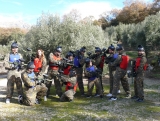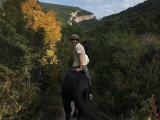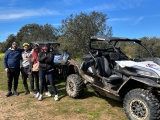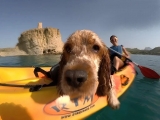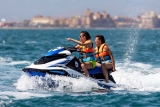
A born fighter who grew up in the mountains and turned his hobby into his profession: he competes in cross-country skiing and high mountain sports, disciplines not accessible to everyone. He holds countless titles and trophies to which he doesn't attribute more importance than they deserve, as for him what matters is being able to dedicate himself to the mountains, which have brought him so much joy and, at times, defeat.
We've followed his career and here are some of his news stories: Kilian Jornet at the World Mountain Ski Championships.
He's spoken with Yumping and told us about his journey, why he's passionate about mountains, and how far he'd like to go.

Yumping.- From a very young age you've been surrounded by mountains and snow. Tell us, at what age did you start mountain sports?
Kilian Jornet.- The first time I put on skis was at 2 months old, at the New Year's race in La Molina, but I started cross-country skiing at 2 years old.
Y.- Were the beginnings tough?
K.J.- Tough? No, it was a game, my parents taught me to go to the mountains through play. And playing isn't tough - it's fun!

Y.- One advantage you had was that both your parents and school instilled in you a love for the mountains. But when did you decide you wanted to pursue this sport professionally?
K.J.- That I do these mountain sports isn't coincidental - as a child I lived with my parents and sister at the Cap del Rec mountain refuge, located at the Lles de Cerdanya cross-country ski station in the Catalan Pyrenees. That's where we started going to the mountains and skiing. Before taking our first steps on foot, we'd already done our first kilometres on skis. For my sister and me, sport was a game - the only way we had to have fun up there. After school in summer we'd play running through the mountains and forests around the refuge, and in winter we'd do the same on skis. Plus, our parents were (and still are) mountain enthusiasts, and during holidays we'd always go on treks or climb peaks. By age 5 we'd already done several "3-thousanders" like Aneto, Posets, the full Pyrenean traverse and some 4,000m peaks.

Y.- Where did you find most support to pursue this?
K.J.- In minority sports it's essential to have people supporting you, believing in you. Often it's family. Mountain skiing required training before school - we'd get up with Nuria (my mother) to climb Tosa d'Alp before school. She often drove us to competitions - long journeys... Without this support, especially seeing your family enjoys and strongly backs what you do, it's impossible to succeed.

Y.- When did you start competing?
K.J.- At 13, in secondary school, when we discovered by chance there was a Mountain Ski Training Centre (CTEMC). I took the selection tests and discovered competitive mountain skiing, starting serious, planned training with technicians' help - Maite Hernández taught me to train and fight, Jordi Canals instilled great love for this sport and passion for competition.
Y.- There must be much rivalry in championships. Is it hard to find friendship during season?
K.J.- Quite the opposite - there's great atmosphere, my best friends are also rivals. During races you try to win, but before and after we share great friendship. We all love the same thing!

Y.- Like your professional colleague Mireia Mir (whom we also interviewed), you studied STAPS, equivalent to Sports Science. Where would you like to be in a few years?
K.J.- Where I am - in the mountains. Staying connected to what I love - mountain skiing and trail running. How? I don't know - as coach, in marketing, projects... but always in the mountains.
Y.- After your 2006 kneecap injury forced you to withdraw from competition, was it hard to return?
K.J.- After the injury I didn't know if I'd return to previous level, which scared me. So I trained intensely to return to high-level competition. Late that summer I raced again, winning Gore-Tex series events and setting the world vertical kilometre record.
Since then I've continued with major sporting successes in 2007, allowing me to pursue projects supported in various areas.

Y.- You practise a sport of self-improvement where you constantly push limits. Have you reached yours or can you keep improving?
K.J.- Limits are meant to be overcome. I ran the 168km Ultra-Trail du Mont-Blanc; next year Corsica's 190km; then Tahoe Rim Trail... But it's not just distance - factors like elevation, speed, technique matter. I like trying all challenges, but sometimes we quantify sporting achievements too much and forget the feelings, which are what really matter. The important thing is approaching limits, never reaching them.

Y.- What's a typical day for Kilian Jornet?
K.J.- Depends on the race I'm preparing. Normally 3-4h mornings, 1-1.5h afternoons - skiing in winter, running in summer. Seven days a week.
Y.- What hobbies do you have besides running and skiing?
K.J.- Being home quietly or at a remote mountain lake. Reading, music to relax: Bach, Els amics de les Arts or Ludovico Einaudi. Also drawing, contemplating landscapes, listening, painting...

Y.- Which trophy do you cherish most?
K.J.- I don't like keeping trophies. Some are nice, like Giir di Mont scissors or WS leopard, but trophies are impersonal, artificial - no emotion. As Antoine de St. Exupery said: "What is essential is invisible to the eye."
Y.- Your CV is extensive - how far would you like to go?
K.J.- Does man live by CV? When I die I won't care about winning this or that race. What has it given me? Sponsors, media, popularity... Things I often associate negatively with my lifestyle, as they take time from the mountains. I'd like a CV full of emotions, good memories, listening to interesting people, knowing cultures, enriching myself.

Y.- Which competition did you enjoy most? And least?
K.J.- Most? Many, for different reasons - some for level, others for friendships, landscapes. You must find magic in each.
Least? Table Mountains and Cavalls del Vent this year. Not the races, but I'd lost running's pleasure.

For short races (42km), Zegama in Basque Country; for long (167km), Diagonale des Fous on Réunion Island - both have incredible atmosphere, thousands cheering in mountains... Diagonale des Fous is spectacular.
Y.- What advice would you give someone starting mountain sports?
K.J.- Enjoy it, don't think of sport without enjoying daily life. The mind is our strongest muscle.

Y.- How did you decide to publish "Run or Die"? Are you happy with it?
K.J.- We didn't expect such success. It's been well received. For me, writing it gave perspective, and I hope it motivates people to go to mountains or run.

Photos: Salomon and kilianjornet.cat





